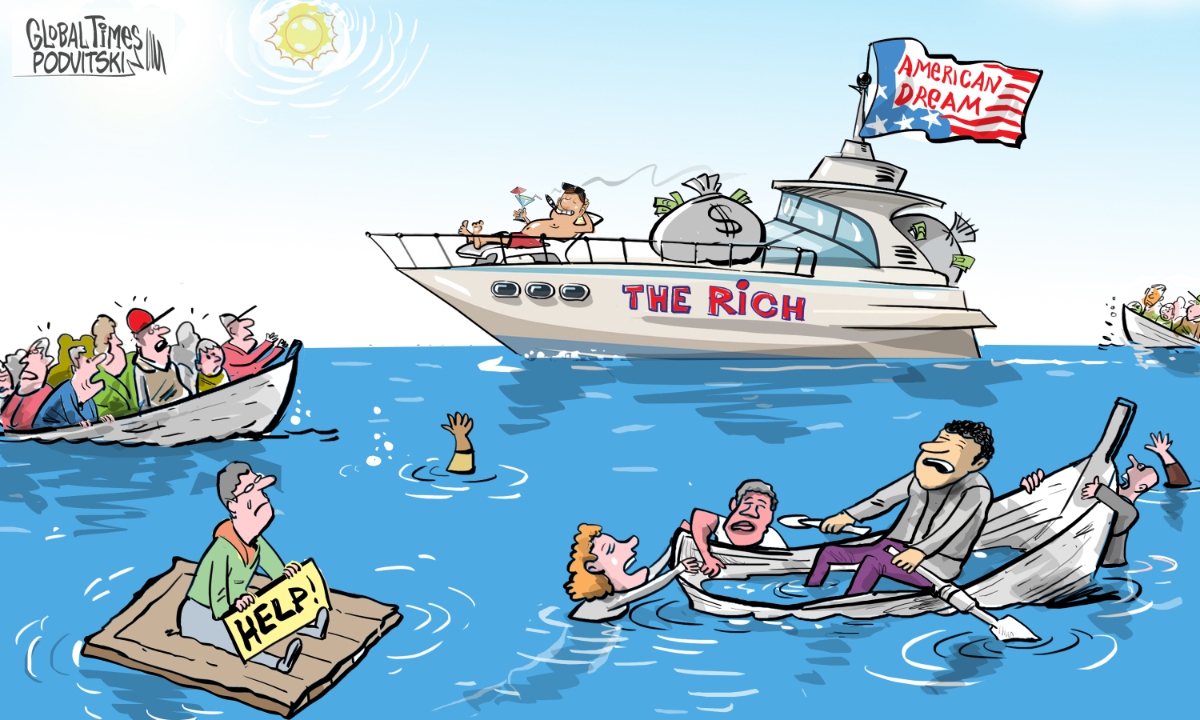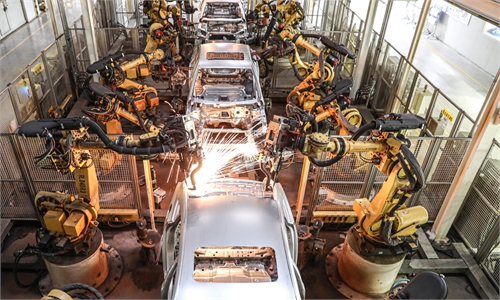
America's widening wealth gap. Cartoon: Vitaly Podvitski
The economic strain felt by average working individuals in the Western world, particularly in the US, has reached a critical juncture, compelling many to reassess fundamental aspects of their lives, including decisions about family and pets. As inflation continues to surge, the financial burden on households has become increasingly untenable, leading to difficult choices and heartbreaking consequences.The millennial generation, already grappling with economic precarity, is now confronting the daunting prospect of raising children amid soaring living costs. The soaring expenses associated with childcare, education and healthcare have made the prospect of starting a family seem financially insurmountable for many young adults. Similarly, the rising costs of pet ownership have exacerbated the dilemma, prompting a distressing trend of pet abandonment in shelters across America.
The Time magazine reported in January that the dip in adoptions along with the rise in dog intake at shelters marks a stark reversal from the surge in adoptions of dogs and cats seen during the pandemic.
Despite the initial surge in pet adoptions during the pandemic, concerns about the ongoing costs of pet care have become increasingly prevalent. By September 2022, a staggering 35 percent of pet owners expressed apprehensions about the financial strain associated with pet ownership in the current economic climate. Shockingly, half of those respondents said they may need to surrender their pets due to financial constraints. This dilemma highlights the harsh reality many families are facing. They are torn between an emotional attachment to their pets and economic challenges.
The financial burden of pet ownership is not trivial, with annual costs for dog ownership estimated to range from $500 to $1,000, and around $650 for cats, according to the ASPCA. Moreover, a survey conducted by Forbes Advisor underscores the precarious financial situation of many pet owners, revealing that nearly 40 percent struggle to afford an unexpected veterinarian bill of $999. These financial pressures, exacerbated by the broader economic insecurity stemming from the pandemic, have left millions of households teetering on the brink of financial collapse, with their cherished pets caught in the crossfire.
Importantly, the disparity in access to basic necessities, such as the companionship of pets, underscores the entrenched class divisions within modern American society. Economic inequality, a pervasive and systemic issue, disproportionately burdens working-class individuals, making it increasingly difficult for them to afford the joys of pet ownership. While the affluent can afford to provide their children and pets with lavish care and attention, those on the lower end of the socioeconomic spectrum are forced to navigate agonizing decisions between financial survival and the well-being of their loved ones.
This stark contrast in opportunities highlights the fundamental flaws of an economic system that prioritizes profit margins over the dignity and welfare of its citizens. As millions of Americans struggle to make ends meet amid rising costs and stagnant wages, it becomes imperative to address the root causes of inequality and advocate for policies that prioritize the needs of all individuals, regardless of their socioeconomic status.
By implementing measures that promote economic justice and social equity, we can begin to dismantle the systemic barriers that perpetuate the cycle of poverty and economic precarity. This requires a concerted effort to prioritize human dignity over corporate interests and to ensure that all members of society have equal access to the resources and opportunities necessary for a dignified and fulfilling life.
As The Guardian reported in January of this year, half of inflation in the US is due to corporate price gouging. A report written by the Groundwork Collaborative think tank revealed that corporate profits accounted for about 53 percent of inflation during last year's second and third quarters. It is no exaggeration to say that the profit motive at the core of Western society is, quite literally, cannibalizing the family unit and undermining the fundamental well-being of society's most vulnerable - including pets.
Ultimately, the plight of pets - and, importantly, their owners - underscores the urgent need for systemic reforms to address the root causes of economic inequality and insecurity. As policymakers grapple with the fallout from the pandemic, it is imperative to prioritize measures that support struggling families. Only through concerted efforts to address economic disparities and provide adequate support for pet owners can we ensure that all families can enjoy the companionship of their pets without facing undue financial hardship.
The author is a Prague-based American journalist, columnist and political commentator. opinion@globaltimes.com.cn



